Scroll

The D Profile #2
Jean
Tezenas
du Montcel
Indefatigable and super-sporty earth Ninja
He laughs, he smiles, he listens, he chooses his words carefully. He’s no TV celebrity. But for some years now, Jean has been the star of the Ninja Warrior sports programme in France, after a stint in the same role in China. Yet this expert mountaineer and gymnast is more than just an acrobat in front of the camera on a timed course. At the Mountain Store, he is a designer-engineer for Forclaz, and works with Simond: passions for invention and sustainability shared at the foot of Mont Blanc. A superb interview with a true hero of nature, who talks about all aspects of his life at Decathlon.
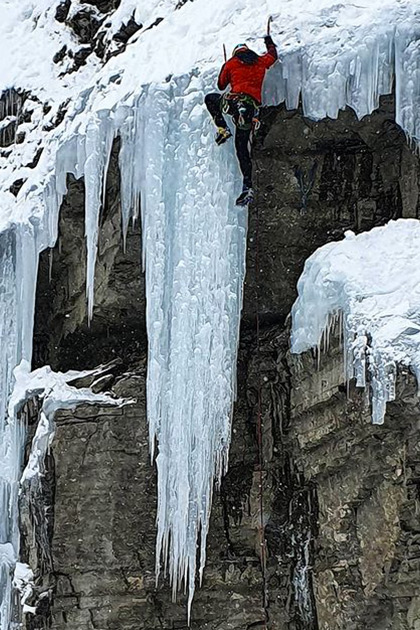
Jean, can you tell us about your academic and sporting past?
JTDM: I’ve studied at engineering schools: I started at Troyes university, then at INSA in Lyon. I then completed a work placement in Annecy, and my sports career soon merged with my academic one: I discovered mountain sports, even though I’d always done climbing. I tried every sport, even rugby, but I was useless. I then played tennis, and after that I got seriously into gymnastics. Following an ankle injury, I moved onto climbing, which has been my overriding passion ever since.
My Path
My Voice
Climbing is now almost second nature to you…
JTDM: I've been climbing ever since I was born, so to speak, but I really got into it in a big way later on. I've become a keen climber after an injury forced me to give up the gym. It was then that I discovered what climbing really was: a sport with an incredible mindset. When I arrived in Annecy, I met a friend who introduced me to mountain sports: I fell in love with it instantly! It felt like a kind of culmination. I had found my path, and my voice!
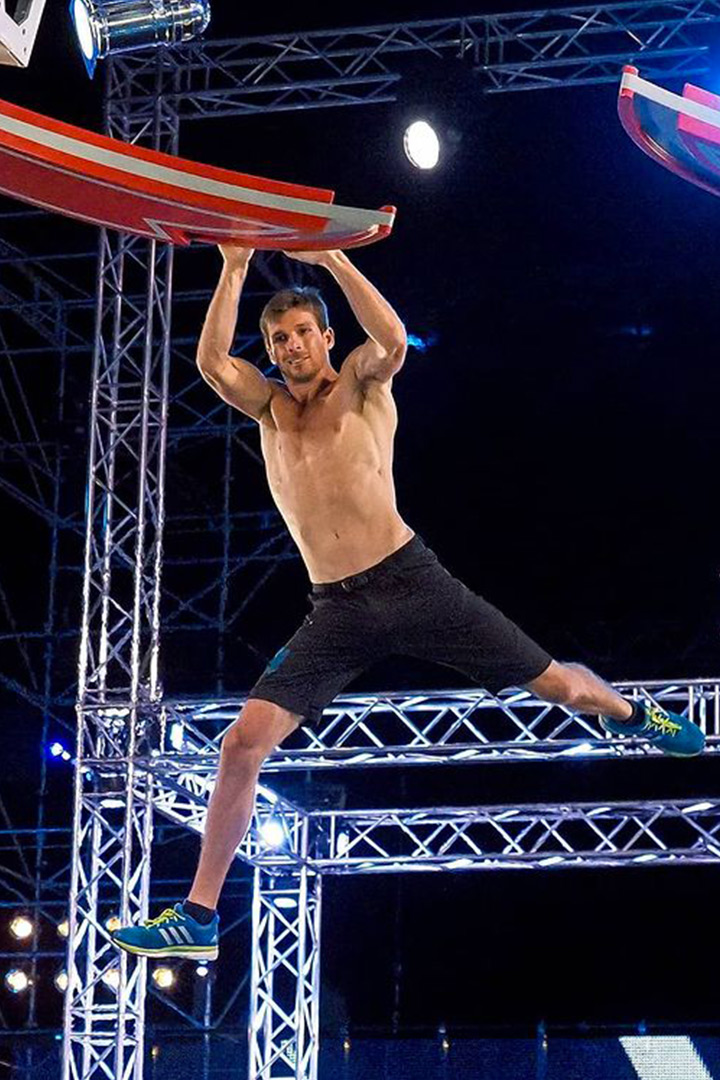
Did climbing make you into a “Ninja Warrior"?
JTDM: As part of my studies, I went to live in Shanghai for four months. One day, I got a text from a group of climbers who were looking for a European to take part in the programme. I replied: “Fine with me, I’m up for that.” And that’s how I came to take part in the Chinese Ninja Warrior. It all went really well, I did it barefoot, listening to my iPod on headphones. I then came back to France. Friends who had seen the television (not me) sent me photos saying “Do the French version!” I sent one of my videos of the Chinese experience, showing me totally chilled, with my headphones, and bare feet. And the casting guys said: “Come to Paris”. I almost didn’t go, because it was a long way from Annecy, but I did anyway… I did the audition, and went home. Two weeks later, they told me that I’d been chosen. Two days before the programme, they said they didn’t need me any longer; I had to negotiate a bit, and eventually they agreed. I don’t think they regretted their decision.
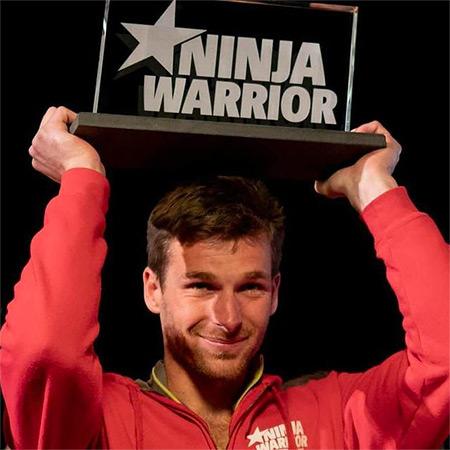
Tell us what happened next!
JTDM: I then took part in my first season of Ninja in France. It went really well, and got pretty good results, even though I created some buzz because I’d smashed the first course. I really killed it in terms of my time! People then said: “Ah yeah, it’s really cool." As I was stressed and I did it in record time, it made for a bit of an incongruous image. In season two, I got a really good score, but I didn’t win. However, I was first in all stages, except the last. In season three, I came first in all stages, including the last one, but I couldn't win the overall game. And in season four, I made it right to the end (the last obstacle) but wasn’t the only one who had to climb it. Astonishingly I racked up the best time and became the first Frenchman and 7th international to finish the game. I was very proud of myself. And I was even more proud of season five, the last one. Unfortunately, I was pipped to the post by just a few inches. But it really had been tight... I did Ninja Warrior for three seasons while I was at Decathlon.
Ninja Warrior is about fitness, climbing, speed, lots of sports in one, don’t you think?
JTDM: For me, there’s pretty much something for everyone in Ninja Warrior. What’s interesting is that there are three pre-required sports: climbing, gymnastics and parkour. You may not need to be a professional climber, but you need strength in your fingers to surmount the obstacles. Gymnastic skills also help a lot with balancing and gaining momentum. Knowing how to manoeuvre your body and handle the ropes is vital. Parkour teaches you to place your feet accurately. I would add in a fourth prerequisite: the ability to interpret and a form of foresighted intelligence, so you know how you surmount the obstacle. You also need weight training, but, rather than pumping iron, you need to train with your bodyweight to become agile.
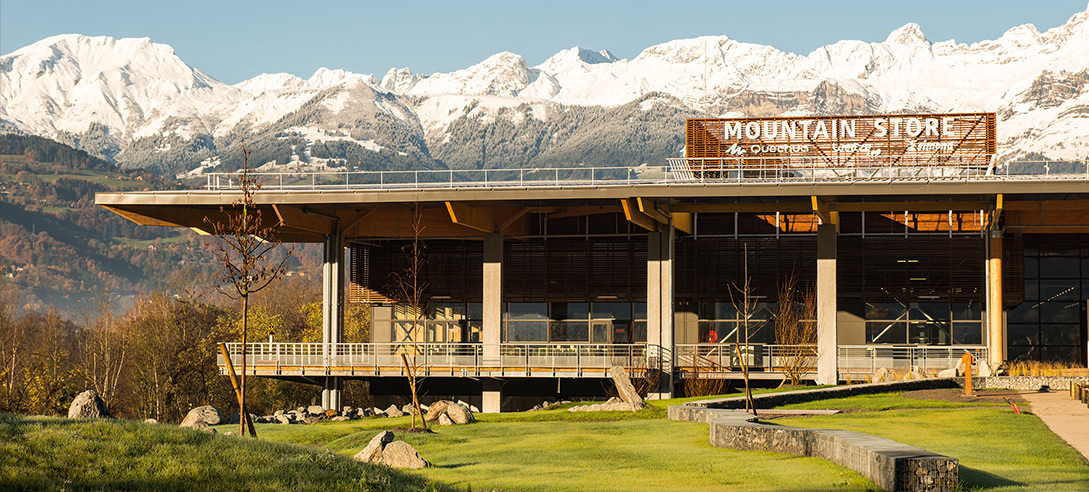
It’s been three and a half years since I joined Decathlon, and it’s all going really well.
Tell us how you came to be at Decathlon…
JTDM: I didn’t really enjoy the engineering school placements, so I joined a business school, EM Lyon, and I took the sports industry management course with Outdoor Sports Valley, quite near to Decathlon, via Quechua. And so a link was forged. It was actually a Quechua product manager, Jean-Charles Laugt, who recruited me. He’s quite extraordinary. I never thought I’d have a chance, because I’d left my previous job under a cloud, but he wasn’t interested at all; he said: “It’s you I want, and no one else!". I’ve got a strong personality and Decathlon is a business with a strong culture... several adjustments have been required, involving strong personalities, let's say. But it’s been three and a half years since I joined Decathlon, and it’s all going really well.
What’s your job at Forclaz, and what are your missions?
JTDM: I’m a product engineer for tents. I was hired to replace a product engineer who became a designer, as you do at Decathlon.... I work on tents and hiking mattresses for the Forclaz brand. These products are lightweight and compact. I joined the brand four years ago. At the time, Forclaz was selling a trekking tent range. They were quality items, but still needed improvement. My first mission was therefore to redesign the trekking tents so they fulfilled expectations. In 2020, we brought out twelve models at once, one of which was a value range product, our Trek 100, as well as five mid-range tents (Trek 500) and high end, ultra-lightweight tents, almost half the price of comparable quality tents elsewhere (Trek 900). This is something I'm particularly proud of! I’m currently working on comfortable, mid-range airbeds at unbeatable prices, thanks to our panel of suppliers and a smart design.
This "sustainability” dimension you feel is so important, is it evident in other initiatives in your day to day activities?
JTDM: Yes. As well as the actions I just mentioned, we’re also making multi-purpose adhesive tape in blue, with a lifetime warranty, that can be used to repair anything. I’ve developed small sticky black patches that can be used easily on any airbed, water pouch or rubber ring. I've also been working for Simond as a mountain, alpine and climbing enthusiast. I’ve suggested various innovations of mine to the brand: an ultra-lightweight comfort harness, and ice-screw holders, which I made using 3D printing.

I owe nature
pretty much everything.
You live in the mountains, at the foot of Mont Blanc. Do you find this environment helps?
JTDM: On Ninja Warrior, for the first few series, I used to leave hugely stressed. Over time, I learned how to manage it, and the mountains were a big part of this. In the mountains, I either go, or I stay at home. Firstly, I looked at the race and all the conditions. It’s afterwards that it gets stressful, if conditions change. But the mountain has this ability to destress you, if you get to grips with it properly. One winter’s day, I went off ice climbing with my girlfriend and some mates. I found myself at the top of the fall; I had just stuck an anchor in, and didn't know if it was holding properly. I was at the end of my tether, I no more strength, banging my picks into the ice, but they wouldn't hold. My leg started shaking with fatigue and fear. I held on… At that point, there was no other way to get down. The only thing to do was to carry on. And that’s why I find the mountain and nature so interesting. On Ninja Warrior, I tap into my experiences in the mountains. For example, I learned that it’s pointless stressing for more than 15 minutes before going on camera. I would get stressed out later, and that’s a real strength, as I manage the rising stress as well as the come-down. In life, the environment helps me to reconnect with my feelings, and therefore to live better.
So this relationship with nature you talk about is your secret for staying calm, relaxed and connected?
JTDM: Quite honestly, I owe nature pretty much everything, including my Ninja success. Being outside introduces you to lots of useful skills in life, particularly adapting, autonomy, etc. You can find almost any sport in nature: cardio, physical strength, etc. I was lucky enough to have a playground called the Alps; it's incredible living in Chamonix. Yes, nature makes me happy, and I think you need nature if you want to feel fulfilled. It teaches humility. When I go running, for example, there’s always someone to make me despair... when I go climbing, there are kids of 14 and 15 who are better than me. Nature is there to remind us that we can never feel superior to others. It calls us to order. When faced with the mountains, you can only be humbled by their strength.
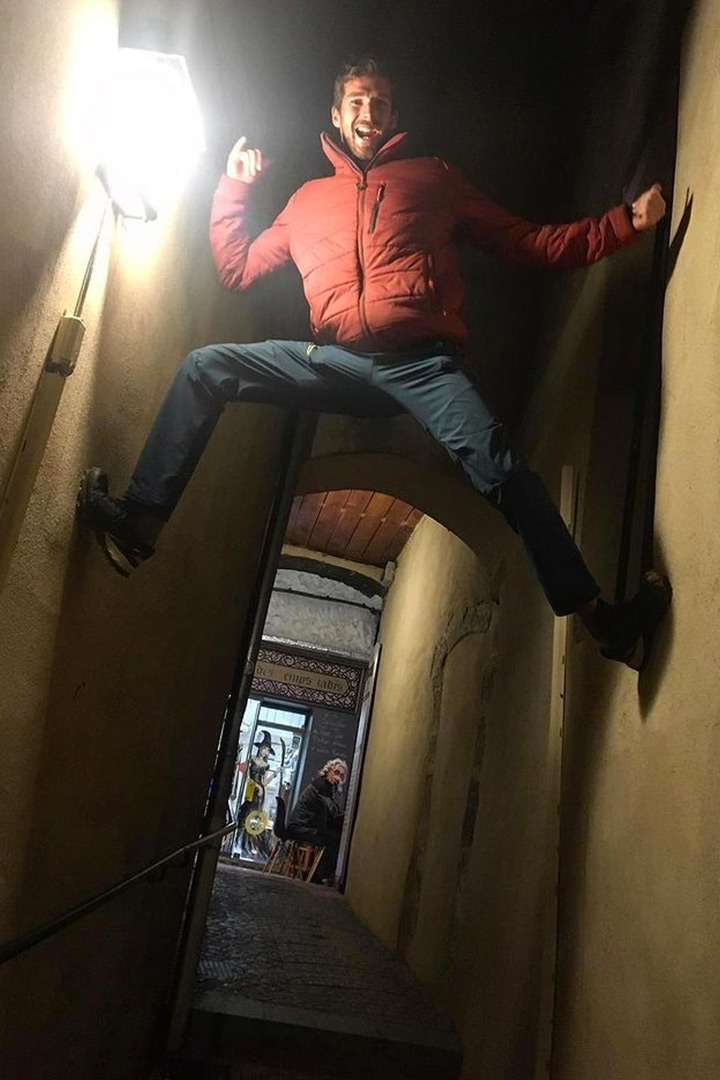
Do you do a specific training routine? Do you always prepare in the same way, or do you alternate exercises and disciplines?
JTDM: I'm often asked this question: “What is your physical and nutritional plan?" Well, you’re going to be disappointed. I have no training plan at all, I’ve never even had a coach in my whole life, and I love eating ice cream, and pasta, with meat and mayonnaise. Otherwise, my training plan in Covid is: Sallanches Mountain Store pull-up bars, until I can’t do any more. After that, I’ll go running. I have absolutely no structure. The only thing I do is make sure that I do sport once every two days, and any type of sport, from mountain biking to running. Above me, I have 1,000m of altitude and a paraglider on my back for taking off, before relaxing in my garden, not far from our Sallanches Mountain Store.
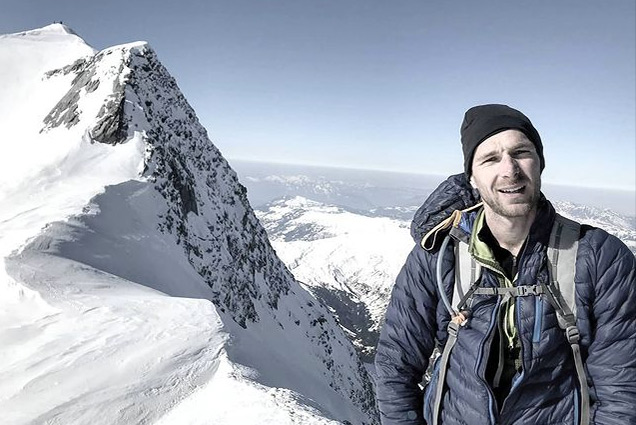
You said you developed a passion for this sport as soon as you became a student. Has it been a common theme throughout your life?
JTDM: At college and at school, I was always the outsider, who didn’t have many friends, who was always in a bit of a mess. In actual fact, this pushed me towards sport. I was bored, so I wanted to get moving. And sport became a real passion, I started to live for it. It totally transformed me. It’s funny to think that I’m now seen by a lot of young people as some sort of model, when I was never at ease around people when I was younger. I tended to be the sort of person everyone ignored. Parents send me videos of their kids learning to climb, or doing sport in general, saying "Thanks, this is because of you!" Sport is the main driver that has formed me and enriched my life. Once you get into it, you get so much pleasure from it that it becomes a type of natural drug that’s both legal and responsible.
So do you feel sport is how to find your place in society and in life?
JTDM: Yes, sport was a way of finding my place, even though I never excelled at sport, unless you count Ninja Warrior (laughs). I was just a good all-rounder. My Ninja adventure? It’s a dream to be able to start a new discipline and to be good at it suddenly, without knowing how. Otherwise, sport for me is basically a way of escaping everything. And yes, a way of finding your place in a world that was hard for me when I was young.
In today's challenging world, both economically and healthwise, do you see sport as one of the most appropriate vectors?
JTDM: Yes, for me, sport is always a solution to a large part of our problems on this planet, for several reasons. The first is that people get bored in our society! And when they get bored, what do they do? They consume, and that’s really bad. So by doing sport, you don’t get bored and you don’t consume. The second reason is that by doing sport, you get physically fit, so you have fewer health problems. And, the third point: by doing sport, you’re helping to look after the planet. If you go running, you’ll feel so good afterwards that you won't feel the need to buy yourself the latest on-trend item. Because when we get the urge to shop, it reflects a hole, something missing, and for me sport helps to fill this hole. Because sport is primarily the solution if you don’t want to get bored, if you want to stay in shape. But sport is also an ecological solution.
Within this framework, Jean, what’s the role you see yourself in? Do you feel like a sports ambassador for younger kids, for example?
JTDM: Right now, I feel my role is to encourage young people. During my childhood, I had to push myself a lot more to prove myself. Now I’m older and have fewer things to prove, to others and to myself, I want to be someone who shares their experience. Several years ago, a friend was looking after young people at weekends in an association, "Le Rocher", in the northern districts of Marseille. I went to spend a day with him. I said: “Wait, I'll take some climbing ropes.” I filled my bag with ropes and screws - I'm not sure quite how legal any of this was... Then we took them to the Calanques de Marseille. They looked at us and said: “No way, that’s impossible. No one can go that far!” So we said to them: “Yes, you’ll see, you'll be able to do it." At the beginning of the day, they talked about video games, new shoes and stuff linked to consumerism. They climbed, ran back down and swam in 14°C water. At the end of the day, all they could talk about was being outside and going on trips. For me, it was the perfect illustration of how sport can change the world. That day in the Calanques was one of the best shared experiences of my life.

I prefer kind, modest people to those who brag about themselves.
Knowing that developments are permanent at Decathlon, what would you like to do in the future with us?
JTDM: For me, the future goes hand in hand with the present. I’m a big fan of repairs. We’ve been working on tent repairs for more than three years now. They are all 100% repairable: all our poles are exactly the same length so we don’t have to re-cut them for each individual model; all our parts are available as spares so that repairs can be carried out in five minutes.
What are the countries that appeal to you in particular? And who are the champions who inspire you?
JTDM: China has had a very valuable experience, but I was struck by the pollution in urban areas. I feel drawn to any country with mountains, and where you can climb or do mountaineering. So I’m extremely lucky here where I am! What’s more, I work in our international design centre for Decathlon mountain products. I’m more inspired by actions than by people, but there is someone who's massively inspired me with their humility and simplicity: Ueli Steck, who is no longer with us. He was an extremely good climber, probably the best of his generation, who climbed the north face of the Eiger in two hours and 21 minutes, when three days is considered a normal time for good climbers. He opened up routes: the south face of the Annapurna (solo); even though this route had been attempted by around ten of the world's best climbers, no one had ever succeeded. This was someone with unparalleled straightforwardness and honesty. I much prefer kind, modest people to those who brag about themselves… Ueli was strong, but so humble.
Have you found this humility at Decathlon?
JTDM: Decathlon… When you join Decat’, you don't realise it but we need to talk about it more. There are lots of people who do exceptional things in sport, with a fantastic sporting career, but who are so humble that, if you don’t ask them, you would never know. I work every day as part of a project group with my trail-running product manager, who covered 380km and 25,000m of ascent in under 150 hours. He slept three hours in five days and had hallucinations while running. Another engineer, who works on camping stoves, was mountain biking world vice-champion. And they never talk about it! It’s incredible, because they have this very humble mindset, a bit too humble, perhaps, where they don't talk much about themselves. At Decathlon, I feel that people don't generally boast about themselves, which I think is really great.
